Business Ethics~商业道德
商业的英文概念
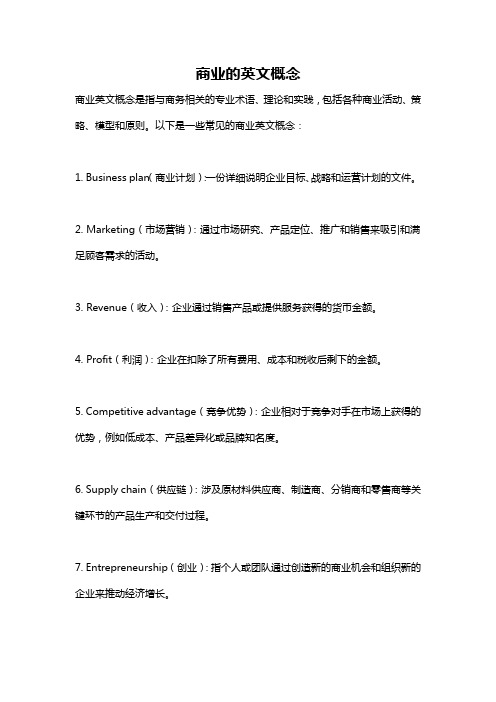
商业的英文概念商业英文概念是指与商务相关的专业术语、理论和实践,包括各种商业活动、策略、模型和原则。
以下是一些常见的商业英文概念:1. Business plan(商业计划):一份详细说明企业目标、战略和运营计划的文件。
2. Marketing(市场营销):通过市场研究、产品定位、推广和销售来吸引和满足顾客需求的活动。
3. Revenue(收入):企业通过销售产品或提供服务获得的货币金额。
4. Profit(利润):企业在扣除了所有费用、成本和税收后剩下的金额。
5. Competitive advantage(竞争优势):企业相对于竞争对手在市场上获得的优势,例如低成本、产品差异化或品牌知名度。
6. Supply chain(供应链):涉及原材料供应商、制造商、分销商和零售商等关键环节的产品生产和交付过程。
7. Entrepreneurship(创业):指个人或团队通过创造新的商业机会和组织新的企业来推动经济增长。
8. Market segmentation(市场细分):将市场分割为不同的消费者群体,以便定位服务和定制营销策略。
9. SWOT analysis(SWOT分析):评估企业的优势、劣势、机会和威胁,以制定适应环境和实现目标的战略。
10. Corporate social responsibility(企业社会责任):企业在经营过程中对社会和环境负责的义务和活动。
11. Financial statement(财务报表):以数字形式汇总企业财务状况和业绩的文件,包括资产负债表、损益表和现金流量表。
12. E-commerce(电子商务):通过互联网和电子技术进行商业活动,包括在线购物、在线支付和电子市场。
13. Branding(品牌塑造):通过创建和传播在市场上独特且有价值的品牌形象,以吸引和保留顾客。
14. Business ethics(商业道德):关于商业活动中正确和道德的行为准则,包括诚信、透明度和社会责任。
商业道德英语作文
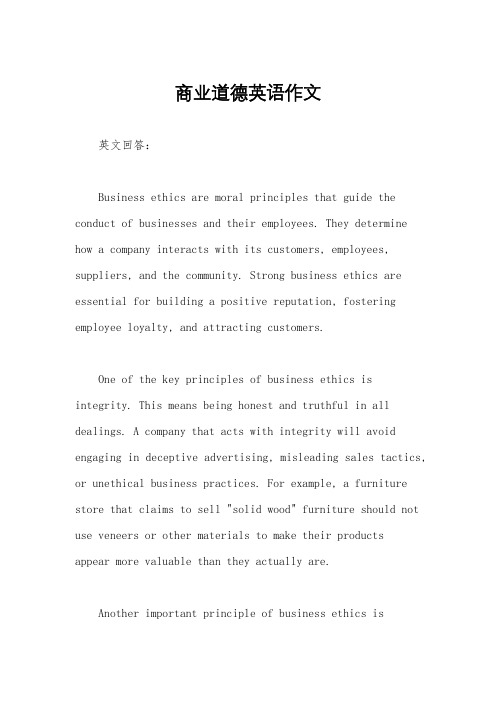
商业道德英语作文英文回答:Business ethics are moral principles that guide the conduct of businesses and their employees. They determine how a company interacts with its customers, employees, suppliers, and the community. Strong business ethics are essential for building a positive reputation, fostering employee loyalty, and attracting customers.One of the key principles of business ethics is integrity. This means being honest and truthful in all dealings. A company that acts with integrity will avoid engaging in deceptive advertising, misleading sales tactics, or unethical business practices. For example, a furniture store that claims to sell "solid wood" furniture should not use veneers or other materials to make their productsappear more valuable than they actually are.Another important principle of business ethics isfairness. This means treating everyone with respect and equity. A company that acts fairly will not discriminate against customers or employees based on their race, gender, religion, or other personal characteristics. For example, a clothing store should not charge different prices for the same item to customers of different races or ethnicities.Responsibility is another key principle of business ethics. This means taking responsibility for the impact of your actions on others. A company that acts responsiblywill consider the environmental and social implications of its products and business practices. For example, a mining company should not engage in activities that pollute the environment or harm local communities.Accountability is also an important principle of business ethics. This means being accountable for your actions and taking responsibility for any wrongdoing. A company that acts with accountability will have clear policies and procedures in place to prevent unethical behavior and will take swift action to address any violations of its ethical standards. For example, a companythat discovers that one of its employees has engaged in bribery should fire the employee and report the incident to the appropriate authorities.Transparency is another key principle of business ethics. This means being open and honest about your business practices. A company that acts with transparency will disclose all relevant information to its customers, employees, and the public. For example, a food company should clearly label its products with all ingredients and nutritional information.Compliance is also an important principle of business ethics. This means following all applicable laws and regulations. A company that acts in compliance will not engage in any illegal or unethical activities. For example, a pharmaceutical company should not sell drugs that have not been approved by the FDA.Ethical leadership is essential for creating a culture of business ethics. Leaders who set a good example and promote ethical behavior will inspire their employees to dothe same. For example, a CEO who refuses to engage in insider trading will send a strong message to the company's employees that ethical behavior is important.Business ethics are essential for creating a sustainable and successful business. By adhering to these principles, businesses can build a positive reputation, attract and retain customers, and create a positive work environment.中文回答:商业道德是指指导企业及其员工行为的道德准则。
business ethic 商业道德
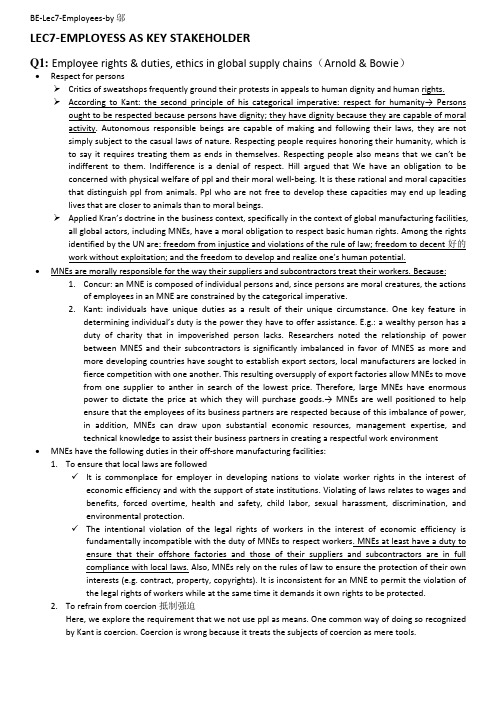
LEC7-EMPLOYESS AS KEY STAKEHOLDERQ1:Employee rights & duties, ethics in global supply chains(Arnold & Bowie)∙Respect for personsCritics of sweatshops frequently ground their protests in appeals to human dignity and human rights.According to Kant: the second principle of his categorical imperative: respect for humanity→Persons ought to be respected because persons have dignity; they have dignity because they are capable of moral activity. Autonomous responsible beings are capable of making and following their laws, they are not simply subject to the casual laws of nature. Respecting people requires honoring their humanity, which is to say it requires treating them as ends in themselves. Respecting people also means that we can’t be indifferent to them. Indifference is a denial of respect. Hill argued that We have an obligation to be concerned with physical welfare of ppl and their moral well-being. It is these rational and moral capacities that distinguish ppl from animals. Ppl who are not free to develop these capacities may end up leading lives that are closer to animals than to moral beings.Applied Kran’s doctrine in the business context, specifically in the context of global manufacturing facilities, all global actors, including MNEs, have a moral obligation to respect basic human rights. Among the rights identified by the UN are: freedom from injustice and violations of the rule of law; freedom to decent好的work without exploitation; and the freedom to develop and realize one’s human potential.∙MNEs are morally responsible for the way their suppliers and subcontractors treat their workers. Because:1.Concur: an MNE is composed of individual persons and, since persons are moral creatures, the actionsof employees in an MNE are constrained by the categorical imperative.2.Kant: individuals have unique duties as a result of their unique circumstance. One key feature indetermining individual’s duty is the power they have to offer assistance. E.g.: a wealthy person has aduty of charity that in impoverished person lacks. Researchers noted the relationship of powerbetween MNES and their subcontractors is significantly imbalanced in favor of MNES as more andmore developing countries have sought to establish export sectors, local manufacturers are locked infierce competition with one another. This resulting oversupply of export factories allow MNEs to movefrom one supplier to anther in search of the lowest price.Therefore, large MNEs have enormouspower to dictate the price at which they will purchase goods.→MNEs are well positioned to helpensure that the employees of its business partners are respected because of this imbalance of power,in addition, MNEs can draw upon substantial economic resources, management expertise, andtechnical knowledge to assist their business partners in creating a respectful work environment∙MNEs have the following duties in their off-shore manufacturing facilities:1.To ensure that local laws are followed✓It is commonplace for employer in developing nations to violate worker rights in the interest of economic efficiency and with the support of state institutions. Violating of laws relates to wages andbenefits, forced overtime, health and safety, child labor, sexual harassment, discrimination, andenvironmental protection.✓The intentional violation of the legal rights of workers in the interest of economic efficiency is fundamentally incompatible with the duty of MNEs to respect workers. MNEs at least have a duty toensure that their offshore factories and those of their suppliers and subcontractors are in fullcompliance with local laws.Also, MNEs rely on the rules of law to ensure the protection of their owninterests (e.g. contract, property, copyrights). It is inconsistent for an MNE to permit the violation ofthe legal rights of workers while at the same time it demands it own rights to be protected.2.To refrain from coercion抵制强迫Here, we explore the requirement that we not use ppl as means. One common way of doing so recognized by Kant is coercion. Coercion is wrong because it treats the subjects of coercion as mere tools.✓Physical coercion: occurs when one’s bodily movements are physically forced. Ppl who make a choice that seems highly undesirable because there are no better alternatives available, these are notcoerced.✓The use of psychological coercion in sweatshops appears widespread, e.g. coercion is frequently used by supervisors to improve worker productivity (workers are forced to work long overtime hours orlose their jobs)✓Respecting workers requires that they be free to decline overtime work without fear of being fired. It also requires that if they are injured or ill, they should be allowed to consult healthcare workers andbe given work that doesn’t exacerbate their illnesses or injuries.3.To meet working conditions✓Many workers are vulnerable to workplace hazards, e.g. repetitive motion injuries, exposure to toxic chemicals, exposure to airborne pollutants, and malfunctioning machinery. The most commonworkplace hazards concerns are fire safety.✓MNEs have a duty to improve those conditions. A failure to implement appropriate safeguards means employers are treating their employees as disposable tools rather than as being with unique dignity4.To provide a living wage for employees✓MNEs and their suppliers have a moral obligation to ensure that employees do not live under conditions of overall poverty by providing adequate wages for a 48 hour work week to satisfy bothbasic food needs and basic non-food needsMaitland’s conclusion: higher wages or labor standards increase poverty and limit economic growth in developing nations. Reason: workers in the urban formal sector of developing nations earn better wages than do workers in the rural informal sector; the imposition强加of wages or labor standards greater than that demanded by the market increases costs →increased costs result in layoffs停工 and slow investment in the formal sector →surplus supply of labor in the informal sector →depresses income in the informal sectorThis conclusion is incorrect. Because:1.Despite Maitland’s faith in the ability of international markets alone to generate ethically acceptable wageand labor standards for MNEs and their contractors, Maitland does n’t himself defend an unrestricted market approach2.Some of the most compelling evidence in support of the proposition that MNEs can improve workplacehealth and safety conditions while avoiding “tragic outcomes” comes from MNEs themselves.3.It is not clear that improving employee wages will inevitably lead to the “tragic outcome” that Maitlandand others predict. Based on recent study, the estimated effect of the minimum wage was either zero or positive. Increased labor costs appear to have been passed on to consumers in the form of higher prices without increasing unemployment.--------------------------------------------Q1是重点,Q2&Q3可以在Q1中展开-------------------------------------------------- Q2:Absolutism VS relativism(用这两种观点来陈述moral issues)1)Ethical absolutism: which claims that there are eternal universally applicable moral principles, according tothis view, right and wrong are objective qualities that can be rationally determined.If an ethical principlewere to be considered valid, than if had to be applicable anywhere.2) Ethical relativism: which claims that morality is context-dependent and subjective. Relativists tend tobelieve that there are no universal right and wrong that can be rationally determined- it simply depends on the person making the decision and the culture in which they are located.Q3: instrumental VS normative reasons to focus on employees as a key stakeholder(请结合LECTURE TWO)1)Instrumentalstakeholder theory: answer the question of whether it is beneficial for the corporation totake into account stakeholder interests.2)Normative stakeholder theory: provide a reason why corporations should take into account stakeholderinterest。
13商业道德

– The act of illegally compensating someone to get a contract, to split money, or to gain further economic, social, or political advantage.
10
第10页,共13页。
Misuse of the Internet
– Includes surfing the Web, Email, Games, etc.
11
第11页,共13页。
Summary
People make decisions within organizations every day. For the most part, they do so with the interests of the organization in mind. The personal values of a manager or employee are not usually the underlying aspect of the decision making. The challenge for organizations is to ensure that decisions are not only profitable, but that they are ethical as well.
Bribery:贿赂行为
– Money, property, or a favor given, offered, or promised to a person or accepted by a person in a position of trust as an inducement to dishonest behavior.
关于商业道德英语作文
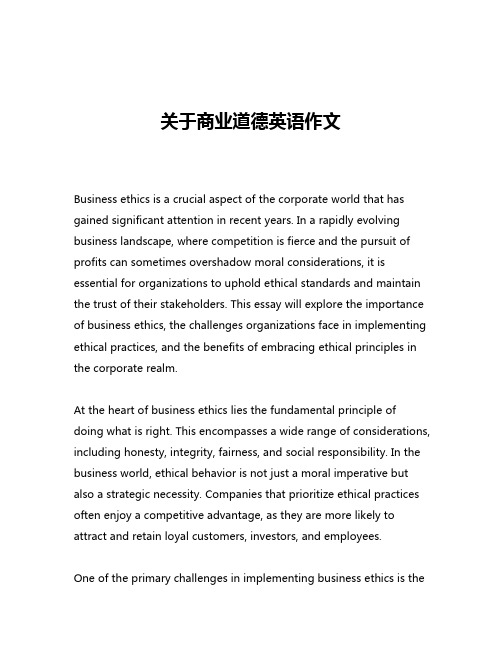
关于商业道德英语作文Business ethics is a crucial aspect of the corporate world that has gained significant attention in recent years. In a rapidly evolving business landscape, where competition is fierce and the pursuit of profits can sometimes overshadow moral considerations, it is essential for organizations to uphold ethical standards and maintain the trust of their stakeholders. This essay will explore the importance of business ethics, the challenges organizations face in implementing ethical practices, and the benefits of embracing ethical principles in the corporate realm.At the heart of business ethics lies the fundamental principle of doing what is right. This encompasses a wide range of considerations, including honesty, integrity, fairness, and social responsibility. In the business world, ethical behavior is not just a moral imperative but also a strategic necessity. Companies that prioritize ethical practices often enjoy a competitive advantage, as they are more likely to attract and retain loyal customers, investors, and employees.One of the primary challenges in implementing business ethics is thepotential conflict between short-term financial goals and long-term ethical considerations. In a market driven by the pursuit of profits, organizations may be tempted to cut corners or engage in unethical practices to achieve immediate gains. However, this approach often backfires, as unethical behavior can lead to legal consequences, reputational damage, and the erosion of public trust.To address this challenge, organizations must cultivate a culture of ethical decision-making. This begins with strong leadership that sets the tone from the top and ensures that ethical principles are embedded into the company's core values and operational procedures. Effective communication, employee training, and robust compliance systems are also essential in promoting ethical behavior throughout the organization.Another significant challenge in implementing business ethics is the complexity of the modern business environment. With globalization, technological advancements, and evolving regulatory frameworks, organizations must navigate a constantly changing landscape of ethical considerations. Issues such as environmental sustainability, data privacy, and human rights can present unique ethical dilemmas that require careful deliberation and nuanced solutions.To overcome these challenges, organizations must adopt a proactive and adaptive approach to business ethics. This involves continuouslymonitoring the evolving business landscape, engaging with stakeholders, and staying informed about emerging ethical issues. By anticipating and addressing potential ethical concerns, companies can mitigate risks and position themselves as responsible corporate citizens.The benefits of embracing ethical principles in the business world are manifold. Firstly, ethical behavior can enhance a company's reputation and brand image, making it more attractive to customers, investors, and potential employees. Ethical companies are often perceived as trustworthy, socially responsible, and committed to the well-being of their stakeholders.Secondly, ethical practices can contribute to long-term financial sustainability. By fostering a culture of integrity and transparency, organizations can build strong relationships with their stakeholders, reduce the risk of legal and regulatory issues, and avoid the costly consequences of unethical behavior.Moreover, ethical practices can boost employee morale and engagement. When employees feel that their organization operates with a strong ethical compass, they are more likely to be motivated, committed, and loyal. This can lead to improved productivity, reduced turnover, and a more positive work environment.Finally, embracing business ethics can have a positive impact on the broader community and society. Companies that prioritize social responsibility and environmental sustainability can contribute to the well-being of the communities in which they operate, and can serve as role models for other organizations to follow.In conclusion, business ethics is a critical component of corporate success and sustainability. By cultivating a culture of ethical behavior, organizations can build trust, enhance their reputation, and contribute to the greater good. While implementing ethical practices can present challenges, the long-term benefits of doing so far outweigh the short-term costs. As the business world continues to evolve, it is incumbent upon organizations to uphold the highest ethical standards and to lead the way in promoting responsible and sustainable business practices.。
商业道德business ethics

Business Ethics商业道德GoalLearn the Modern English dealing with the proper code of conduct to follow while engaged in activities for your company.学会用洋话连篇现代美语恰当处理公司商务活动TeaserDo companies need to do anything special to discourage employees from breaking the rules? Can you think of any well-known example where the basic code of ethics was violated?What do you think should happen to someone who doesn’t follow the recognized business ethics?公司需要采取一些特殊的措施来防止雇员们违反公司的纪律么?你能想到一些广为人知的违背基本道德规范的例子么?你认为应该如何对待不遵守公共商业道德规范的人?Concepts•Based on a simple sense of knowing right from wrong•Company rules and regulations regarding business ethics is standard policy in most Western businesses•Contravention is often a cause for dismissal•Knowing and following the applicable business ethics ensures a healthy operation for the company, the employees, and the customersVocabularyDiscriminationTreating people unfavorably because of age, sex, race, religion, sexual preference, color, creed, or national origin.Sexual harassmentAny form of unwelcome sexual advances, requests for sexual favors, and other verbal or physical conduct of a sexual nature. Constitutes sexual harassment when submission to or rejection of this conduct explicitly or implicitly affects an individual's employment, unreasonably interferes with an individual's work performance or creates an intimidating, hostile or offensive work environment.EspionageProcess of illicitly gathering information using techniques ranging from cloak-and-dagger methods (theft, blackmail, mole planting, seduction, eavesdropping) to modern data gathering measures (electronic surveillance, hiring away key employees, phony business purchase negotiation, reverse engineering, fake job interviews, trash evaluation, etc.).IntegrityThe characteristic of a company or employee holding steadfastly true to company goals, ethics and code of conduct, and behaving in a transparent, truthful, and professional fashion.TruthfulnessTelling things the way they are, according to the facts.HonestyConsistently telling the truth, being sincere, and doing work with integrity.IncompletenessPutting a spin on a business report, presentation, press release, etc., with the intent of giving a favorable impression by hiding adversefacts and figures.TheftThe act of taking something doesn’t belong to you.Misuse of the InternetUsing the Internet on company time for non-company-related pursuits.BriberyMoney, property, or a favor given, offered, or promised to a person or accepted by a person in a position of trust as an inducement todishonest behavior.KickbacksThe act of illegally compensating someone to get a contract, to split money, or togain further economic, social, or political advantage.UsageSexual harassment can occur in a variety of circumstances. The main conditions that apply are: · The victim as well as the harasser may be a woman or a man.· The victim does not have to be of the opposite sex.· The harasser can be the victim's supervisor, an agent of the employer, a supervisor in another area, a co-worker, or a non-employee.· The victim does not have to be the person harassed but could be anyone affected by the offensive conduct.· Unlawful sexual harassment may occur without economic injury to or discharge of the victim. · Th e harasser's conduct must be unwelcome.EspionageEvery business has valuable proprietary data, such as customer and supplier lists, economic, technological and product research reports, sales and marketing plans, know- how and methods of doing business.TheftThe most common business thefts include:Office supplies, computer equipment, food, money.Remember that theft is taking something with the intent to keep it. If you forget a company pen in your pocket, it doesn’t automatically imply theft .Misuse of the InternetIncludes surfing the Web, Email, Games, etc.性骚扰的发生有多种情况。
企业伦理

企业伦理(Enterprise Ethics),也称商业伦理(Business Ethics)企业伦理概述所谓企业伦理(又称为企业道德),是企业经营本身的伦理。
不仅企业,凡是与经营有关组织都包含有伦理问题。
只要由人组成的集合体在进行经营活动时,在本质上始终都存在着伦理问题。
一个有道德的企业应当重视人性,不与社会发生冲突与摩擦,积极采取对社会有益的行为。
企业伦理观念是美国70年代提出的,最近几年日本也开始对企业伦理问题进行研究。
而我国对企业伦理的认识与研究尚处于起步阶段,对企业伦理的内涵尚缺乏了解。
有人认为,企业是将赚钱作为主要目标的,伦理则是追求的道德规范,企业的经营目标与没有必然联系,甚至是水火不相容的,因此认为企业的经营目标和经营伦理是相矛盾的。
其实这不过是表面现象,追求利润为唯一目标的思维方式是落后于新时代的。
在当今时代,如果企业只追求利润而不考虑企业伦理,则企业的经营活动已越来越为社会所不容,必定会被时代所淘汰。
也就是说,如果在企业经营活动中没有必要的伦理观指导,经营本身也就不能成功。
树立企业伦理的观念,体现了重视企业经营活动中人与社会要素的理念。
企业伦理范围企业伦理的内容依据主题可以分为对内和对外两部份:∙内部:劳资伦理、工作伦理、经营伦理;∙外部:客户伦理、社会伦理、社会公益。
1、企业与员工间的劳资伦理:劳资双方如何互信、劳资双方如何拥有和谐关系、伦理领导与管理、职业训练(员工素质的提升,包括职前训练与在职训练)。
2、企业与客户间的客户伦理:∙最主要是服务伦理,服务的特质包括;无形性(intangibility)、不可分割性(inseparability)、异质性(heterogeneity)与易逝性(perishability)。
∙客户伦理的核心精神:满足顾客的需求才是企业生存的基础。
顾客是企业经营的主角,是企业存在的重要价值。
3、企业与同业间的竞争伦理:不削价竞争(恶性竞争)、散播不实谣言(黑函、恶意中伤)、恶性挖角、窃取…。
对商业道德的看法英语作文
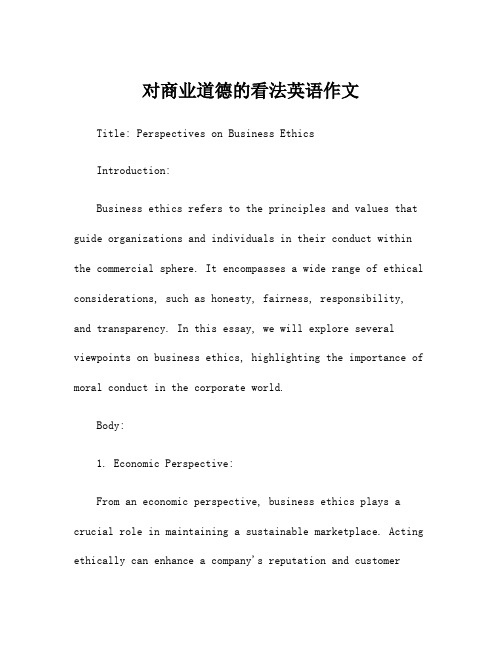
对商业道德的看法英语作文Title: Perspectives on Business EthicsIntroduction:Business ethics refers to the principles and values that guide organizations and individuals in their conduct within the commercial sphere. It encompasses a wide range of ethical considerations, such as honesty, fairness, responsibility, and transparency. In this essay, we will explore several viewpoints on business ethics, highlighting the importance of moral conduct in the corporate world.Body:1. Economic Perspective:From an economic perspective, business ethics plays a crucial role in maintaining a sustainable marketplace. Acting ethically can enhance a company's reputation and customerloyalty, ultimately leading to increased profitability. Ethical practices such as fair pricing, accurate advertising, and respect for consumer rights build trust and ensure long-term success. Conversely, unethical behavior can lead tolegal consequences, damaged brand image, and loss of market share.2. Stakeholder Perspective:Businesses have a responsibility to consider theinterests of various stakeholders, including employees, customers, suppliers, and the wider community. Ethical conduct involves ensuring fair treatment of employees, nurturing a safe work environment, and providing equal opportunities for growth and development. Meeting customer needs ethically translates into quality products, fair pricing, and honest marketing. Appropriate engagement with suppliers promotes fair trade and responsible sourcing. Ethical behavior toward the community involves environmentalsustainability and corporate social responsibility initiatives.3. Legal Perspective:The legal framework provides a baseline for ethical conduct in business. Legal compliance is essential to ensure fair competition, protect consumer rights, and safeguard against fraud and corruption. Companies that operate within the boundaries of the law demonstrate an ethical commitment to their stakeholders. However, it is important to note that legal requirements do not cover all aspects of business ethics, indicating the need for voluntary adherence to higher moral standards.4. Social Perspective:Business ethics have a significant impact on society as a whole. Ethical businesses contribute positively by creating job opportunities, stimulating economic growth, and fostering innovation. They can also play a role in addressing socialissues through philanthropy, partnerships with NGOs, and sustainable practices. Ethical behavior by corporations can inspire others and drive positive change on a larger scale.5. Long-term Sustainability Perspective:Business ethics are closely intertwined with the conceptof long-term sustainability. Ethical decision-makingconsiders the impact of business actions on the environment, society, and future generations. Sustainable practices, suchas reducing carbon footprint, promoting renewable energy sources, and minimizing waste, reflect ethical responsibility. By prioritizing sustainability, companies can contribute to a better future while maintaining their own long-term viability.6. Global Perspective:Ethical considerations in business expand beyond national borders. In a globalized world, multinational corporationsface unique challenges in navigating diverse cultural andlegal environments. Adapting ethical practices to account forcultural norms while upholding universal values poses a significant challenge. However, by operating ethically across borders, international businesses can foster trust,facilitate economic development, and contribute to global advancement.Conclusion:Business ethics are essential for the well-being of organizations, their stakeholders, and society. Acting ethically not only benefits businesses economically but also ensures fairness, sustainability, and positive social impact. By embracing ethical principles, organizations can contribute to a more just and prosperous world, where success is measured not only by financial growth but also by integrity and responsible behavior.。
- 1、下载文档前请自行甄别文档内容的完整性,平台不提供额外的编辑、内容补充、找答案等附加服务。
- 2、"仅部分预览"的文档,不可在线预览部分如存在完整性等问题,可反馈申请退款(可完整预览的文档不适用该条件!)。
- 3、如文档侵犯您的权益,请联系客服反馈,我们会尽快为您处理(人工客服工作时间:9:00-18:30)。
The government should
Therefore, the government should strengthen credit awareness in the whole society an a credibility education, build strict credit system, on a regulate a contractual relationship.
The second is the reason of the e-commerce itself, because Internet puts up the inherent limitations and the virtual character in the electronic commerce activity, and at the same time its technology is not mature
Employment Policies and Practices
How a company treats current and potential employees reflects on its ethical principles and can damage employee morale or drive away top talent.
With the development of economic integration in the world, the economic development has become an important objective in modern society. The operator who in order to seek the development must be increased the competitiveness of themselves. So, trade secret has been playing an important role increasingly.
Defrauding Customers
Many companies conduct business with a constant eye on the bottom line, a practice that’s not inherently illegal or unethical.
However, if organizations inflate fees and charges, fail to give customers everything they paid for, bill clients for time they don’t work or price gouge in the event of natural disasters or other catastrophes, they breach the trust of clients and the general public.
Ethics violations in Electronic commerce
Electronic commerce is that information technology develops to a certain stage and applies in all kinds of business activities of the product,and it is the result of the development of human civilization.
At present,although the electronic commerce in our country socialist market economy environment has a bright prospect, in its rapid development process it is facing serious moral crisis.
Social and Environmental Impact
Some ethical violations aren’t immediately obvious but gradually cause damage to the community.
Exam ple
Companies that use unethical business practices to squeeze out their competitors could shut down businesses in the community and threaten the economy and people’s livelihoods.
Exam ple
For example, if a company is evaluating bids from several suppliers and accepts gifts from one candidate in exchange for the contract, this constitutes a bribe and unfairly eliminates other
Business
Ethics
商 业
道
德
Business Et hics
?
Business Ethics is what other people can depend upon, what y ou are likely to do
honesty is a prerequisite for development
This is a fundamental measure to establish a new system for socialism market economy and also an inevitable trend to develop social civilization.
commercial vicious competition and Employment Policies
Therefore, stealing trade secret is used as a valid unfair competition means by illegal operators. This kind of behavior will take the will influence of competition forces worked regular, broken the market economic rules or even damaged the healthy
Exam ple
Three separate but related recalls of automobiles by Toyota Motor Corporation occurred at the end of 2009 and start of 2010.
Conflicts of Interest
Than ks.
The public expects that the primary responsibility of employees and company management is to their customers, yet professionals sometimes place their personal benefit first or use their positions to gain favors or other perks.
Center business prin ciples
Good character is your k ey to success
Ethics violations
in business
Just a few decades ago, business ethics received far less attention and scrutiny than they do today. Some questionable practices were regarded as simply the price of doing business and remaining competitive in a crowded marketplace.
child labor The issue of
is a part
of business ethics
Child labour refers to the employment of children in any work that deprives children of their childhood, interferes with their ability to attend regular school, and that is mentally, physically, socially or morally dangerous and harmful.
In developing countries, with high poverty and poor schooling opportunities, child labour is still prevalent.
The incidence of child labour in the world decreased from 25% to 10% between 1960 and 2003, according to the World Bank. Nevertheless, the total number of child labourers remains high
